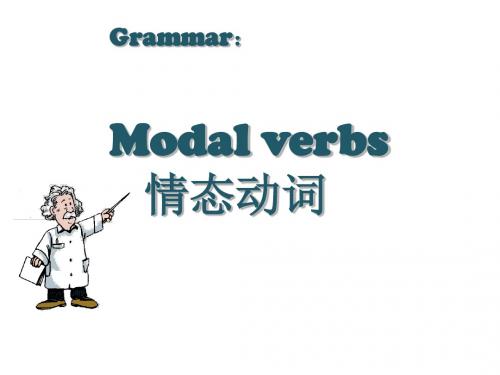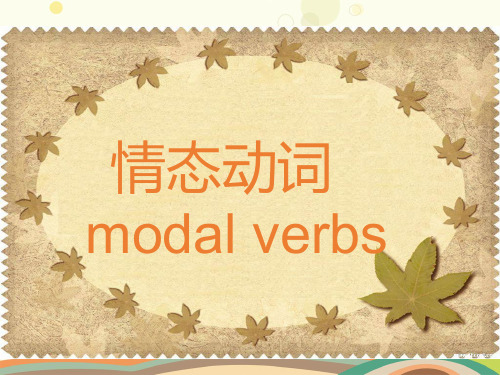情态动词基本用法PPT课件
合集下载
情态动词讲解精ppt课件

例句
will/would
详细描述:will 表示现在的意愿或 预测,would 表示过去的或虚拟 的意愿或预测。
1. I will help you with your project.(我会帮助你完成你的项 目。)
总结词:表示意愿或预测
例句
2. They would have gone to the party if they had known about it earlier.(如果他们早点 知道,他们就会去参加聚会。)
表示意愿
情态动词+动词原形,如 would like to go,表示 某人想要去。
形式变化
基本形式
情态动词的基本形式包括 现在时、过去时和将来时 。
过去式
情态动词的过去式通常是 在基本形式后面加-d或ed,如could have done 、should have done等。
将来时
情态动词的将来时通常是 在基本形式后面加-will或shall,如will be able to 、shall have to等。
may与might的区别与联系
总结词
may表示现在的许可或可能性;might表示过去的可能性或许可。
详细描述
may用于肯定句中,表示许可或可能性,例如“You may use this room.”(你可以使用这个房间。 )“The book may be in the library.”(这本书可能在图书馆里。)might表示过去的可能性,常 用于过去时态的句子中,例如“He might come tomorrow.”(他明天可能来。)
未必、很难说
She might not agree with us.
表示虚拟语气
will/would
详细描述:will 表示现在的意愿或 预测,would 表示过去的或虚拟 的意愿或预测。
1. I will help you with your project.(我会帮助你完成你的项 目。)
总结词:表示意愿或预测
例句
2. They would have gone to the party if they had known about it earlier.(如果他们早点 知道,他们就会去参加聚会。)
表示意愿
情态动词+动词原形,如 would like to go,表示 某人想要去。
形式变化
基本形式
情态动词的基本形式包括 现在时、过去时和将来时 。
过去式
情态动词的过去式通常是 在基本形式后面加-d或ed,如could have done 、should have done等。
将来时
情态动词的将来时通常是 在基本形式后面加-will或shall,如will be able to 、shall have to等。
may与might的区别与联系
总结词
may表示现在的许可或可能性;might表示过去的可能性或许可。
详细描述
may用于肯定句中,表示许可或可能性,例如“You may use this room.”(你可以使用这个房间。 )“The book may be in the library.”(这本书可能在图书馆里。)might表示过去的可能性,常 用于过去时态的句子中,例如“He might come tomorrow.”(他明天可能来。)
未必、很难说
She might not agree with us.
表示虚拟语气
情态动词(17张PPT)初中英语专项复习课件

情态动词表推测也是每年中考的重点,以考查can’t 和must为主,主要在单项选择中考查不同情态动词的辨 析。考生在解答此类试题时,可以从以下几方面着手: ①表示否定的推测:一是断然的否定,此类题一般是考 查情态动词表推测的用法,语境会对所填空给出解释, 据 此 可 以 判 断 是 非 常 肯 定 的 否 定 , 此 时 最 好 用 cannot /can’t;二是表示不能十分肯定或拿不准,此类题一般 也会有相关的语境提示,如I’m not sure、who knows等 ,此时最好用may或might。
表示需要、必须,主 要用于否定句和疑问 句中。needn’t常用 于回答must表请求的 否定回答
—Must I finish my homework now?我必 须现在完成我的家庭作 业吗? —No, you needn’t. 不, 你不需要。
注意 (1) must和have/has to均意为“必须”,常可互 换使用。但have/has to是用于强调客观需要,意为 “必须, 不得不”;must用于表示主观看法, 意为“ 必须, 应该”。如:We’ll have to ask Zhang Hong. 我们必须去问张红了。 We must work hard at school. 在学校我们必须 努力学习。
情态动词本身有一定的意义,但不能独立作谓语, 没有人称和数的变化,后面必须接动词原形。常见的情 态动词有:may, must, need, have to 等,具体用法见下表 :
情态动词
用法
例句
表示能力,意为 Sam can speak English well.
can “能,会”
山姆英语讲得很好。
He could have gone home. 他可能已回家了。
表示需要、必须,主 要用于否定句和疑问 句中。needn’t常用 于回答must表请求的 否定回答
—Must I finish my homework now?我必 须现在完成我的家庭作 业吗? —No, you needn’t. 不, 你不需要。
注意 (1) must和have/has to均意为“必须”,常可互 换使用。但have/has to是用于强调客观需要,意为 “必须, 不得不”;must用于表示主观看法, 意为“ 必须, 应该”。如:We’ll have to ask Zhang Hong. 我们必须去问张红了。 We must work hard at school. 在学校我们必须 努力学习。
情态动词本身有一定的意义,但不能独立作谓语, 没有人称和数的变化,后面必须接动词原形。常见的情 态动词有:may, must, need, have to 等,具体用法见下表 :
情态动词
用法
例句
表示能力,意为 Sam can speak English well.
can “能,会”
山姆英语讲得很好。
He could have gone home. 他可能已回家了。
情态动词语法讲解PPT课件

2表示“许可”和“不许”
a)请求对方“许可”可用can, could, may, might.
may/might较正式,could/might较委婉
表示给予“许可”通常用can/may,而不用 could/might
Could I use your phone? Yes, of course you can. Might I trouble you for a light? You may indeed.
表示将来的“必须”,常用have to的一定 形式(will/shall have to) 比较:
•We must do it again.(表示现在)
•We’ll have to do it again.(表示将来)
•表示过去的“必须”,常用had to
•I had to leave at six yesterday.
•They must be home by now.(他们现在一定到家了)
will/would表示“推测”可有三种情况
1)对特定事态的推测
A: Who’s that man over there? B: That will be George, no doubt. C: That would be George, I except.
• Can they have missed the bus?
• Yes, they may have.
may not重音落在助动词上,表示 “不可能”,重音落在否定词上,表 示“不许可” , 比较:
•He may not go tomorrow.
•He may not go tomorrow.
•所以在书面语中,表示“不可能” 常用can’t
情态动词用法归纳(全)PPT课件

Can this be true? This can’t be done by him. How can this be true?
二、 may, might
1) 表示请求和允许。might比 may语气更委婉,而不是过去式。 否定回答时可用can’t 或mustn’t,表示“不可以,禁止”。
----Might/ May I smoke in this room? ---- No, you mustn’t. ---- May/Might I take this book out of the room? ---- Yes, you can. (No, you can’t / mustn’t. ) 用May I...?征徇对方许可时比较正式和客气,而用Can I...?在
更多的时态。
I’ll not be able to come this afternoon. 当表示“经过努力才得以做成功某事”时应用be able
to,不能用Can。如:
He was able to go to the party yesterday evening in spite of the heavy rain.
情态动词用法归纳
情态动词无人称和数的变化;不能单独 使用,必须与其后的动词原形构成谓语
一、 can, could
1) 表示能力(体力、知识、技能)。 Can you lift this heavy box?(体力) Mary can speak three languages.(知识) Can you skate?(技能) 此时可用be able to代替。 Can只有一般现在时和一般过去式;而be able to则有
三、 must, have to
1) 表示必须、必要。 You must come in time. 在回答引出的问句时,如果是否定的,不能用mustn’t(禁止,
二、 may, might
1) 表示请求和允许。might比 may语气更委婉,而不是过去式。 否定回答时可用can’t 或mustn’t,表示“不可以,禁止”。
----Might/ May I smoke in this room? ---- No, you mustn’t. ---- May/Might I take this book out of the room? ---- Yes, you can. (No, you can’t / mustn’t. ) 用May I...?征徇对方许可时比较正式和客气,而用Can I...?在
更多的时态。
I’ll not be able to come this afternoon. 当表示“经过努力才得以做成功某事”时应用be able
to,不能用Can。如:
He was able to go to the party yesterday evening in spite of the heavy rain.
情态动词用法归纳
情态动词无人称和数的变化;不能单独 使用,必须与其后的动词原形构成谓语
一、 can, could
1) 表示能力(体力、知识、技能)。 Can you lift this heavy box?(体力) Mary can speak three languages.(知识) Can you skate?(技能) 此时可用be able to代替。 Can只有一般现在时和一般过去式;而be able to则有
三、 must, have to
1) 表示必须、必要。 You must come in time. 在回答引出的问句时,如果是否定的,不能用mustn’t(禁止,
情态动词-完整版PPT课件

情态动词 modal verbs
1.情态动词的用法特点
1)情态动词 除 ought 和 have 外,后面只能 接不带to 的不定式。 2)情态动词没有人称,数的变化,即情态动 词第三人称单数不加-s。 3)情态动词没有非谓语形式,即没有不定式, 分词等形式。
can could may might shall should must will would ought to
have to dare need used to
表示推测
情态动词
不表示推测
2.表示推测——情态动词的重要用法.
情态动词
对将来
对现在
对过去
m肯ust/定sho的uld 推测
+ V. + V. + have done
常见must be + be doi定的推测 can’t, couldn’t
疑问的推测
can, could
+ V.
+ V.
+ have done
+ be doing
可以用not表示“可能不”
+V.
+ V.
+ have done
+ be doing
+ V.
+ V.
+ have done
+ be doing
不同的“肯定”程度可按下列层次排列: He is at home. (事实) He must be at home.(非常肯定的推断) He ought to be at home.(很可能) He could be at home.(很可能) He may be at home.(仅仅可能而已) He might be at home.(或许, 非常不确定) He might not be at home.(也许不在家) He may not be at home. (比might可能) He couldn’t be at home.(很可能不在家) He can’t be at home.(一定不在家)
1.情态动词的用法特点
1)情态动词 除 ought 和 have 外,后面只能 接不带to 的不定式。 2)情态动词没有人称,数的变化,即情态动 词第三人称单数不加-s。 3)情态动词没有非谓语形式,即没有不定式, 分词等形式。
can could may might shall should must will would ought to
have to dare need used to
表示推测
情态动词
不表示推测
2.表示推测——情态动词的重要用法.
情态动词
对将来
对现在
对过去
m肯ust/定sho的uld 推测
+ V. + V. + have done
常见must be + be doi定的推测 can’t, couldn’t
疑问的推测
can, could
+ V.
+ V.
+ have done
+ be doing
可以用not表示“可能不”
+V.
+ V.
+ have done
+ be doing
+ V.
+ V.
+ have done
+ be doing
不同的“肯定”程度可按下列层次排列: He is at home. (事实) He must be at home.(非常肯定的推断) He ought to be at home.(很可能) He could be at home.(很可能) He may be at home.(仅仅可能而已) He might be at home.(或许, 非常不确定) He might not be at home.(也许不在家) He may not be at home. (比might可能) He couldn’t be at home.(很可能不在家) He can’t be at home.(一定不在家)
情态动词精品课件PPT课件

第22页/共52页
• It is usually warm in my hometown in March,but it can be rather cold sometimes.
• 我的家乡在三月份通常很暖和,但有时候也会相当冷。 • Mr.Bush is on time for ever ything.How can it be that he was late for the
meeting? • 布什先生做什么事情都很准时,他怎么可能开会迟到呢? • He can't be in the classroom ,for the light has been turned off. • 他一定不在教室里,因为灯已关了。
第23页/共52页
• 2.may用于肯定句中可以用来表示推测,意为“可能”;用于否定句中也可以表示 推测,may not意为“可能不”,表示一种不太确定的语气。may在疑问句中一般不 表示推测。
You'd better not. 等)不,你不可以用。
第11页/共52页
• 3.must和have to的用法 • must表示“必须、应该”。否定形式must not(mustn't)表示“不应该、不许可、
不准、禁止”等。在回答must的问句时,否定式常用need not(needn't)或don't have to表示“不必”,而不用must not,因为must not表示“禁止”。must表 示“一定、必定”等推测意义时,一般只用在肯定句中。 • The work must be finished as soon as possible. • 这项工作必须尽快完工。
第21页/共52页
• 热点考向二 情态动词表“推测”的用法 • 表示对目前或将来情况的推测往往用“情态动词+动词原形”这种结构。 • 1.can用于肯定句中表示可能性,意为“有时会”;用于疑问句中可以表示推测,意
• It is usually warm in my hometown in March,but it can be rather cold sometimes.
• 我的家乡在三月份通常很暖和,但有时候也会相当冷。 • Mr.Bush is on time for ever ything.How can it be that he was late for the
meeting? • 布什先生做什么事情都很准时,他怎么可能开会迟到呢? • He can't be in the classroom ,for the light has been turned off. • 他一定不在教室里,因为灯已关了。
第23页/共52页
• 2.may用于肯定句中可以用来表示推测,意为“可能”;用于否定句中也可以表示 推测,may not意为“可能不”,表示一种不太确定的语气。may在疑问句中一般不 表示推测。
You'd better not. 等)不,你不可以用。
第11页/共52页
• 3.must和have to的用法 • must表示“必须、应该”。否定形式must not(mustn't)表示“不应该、不许可、
不准、禁止”等。在回答must的问句时,否定式常用need not(needn't)或don't have to表示“不必”,而不用must not,因为must not表示“禁止”。must表 示“一定、必定”等推测意义时,一般只用在肯定句中。 • The work must be finished as soon as possible. • 这项工作必须尽快完工。
第21页/共52页
• 热点考向二 情态动词表“推测”的用法 • 表示对目前或将来情况的推测往往用“情态动词+动词原形”这种结构。 • 1.can用于肯定句中表示可能性,意为“有时会”;用于疑问句中可以表示推测,意
情态动词讲解ppt课件共33页35页PPT

情态动词讲解ppt课件共33页
11、获得的成功越大,就越令人高兴 。野心 是使人 勤奋的 原因, 节制使 人枯萎 。 12、不问收获,只问耕耘。如同种树 ,先有 根茎, 再有枝 叶,尔 后花实 ,好好 劳动, 不要想 太多, 那样只 会使人 胆孝懒 惰,因 为不实 践,甚 至不接 触社会 ,难道 你是野 人。(名 言网) 13、不怕,不悔(虽然只有四个字,但 常看常 新。 14、我在心里默默地为每一个人祝福 。我爱 自己, 我用清 洁与节 制来珍 惜我的 身体, 我用智 慧和知 识充实 我的头 脑。 15、这世上的一切都借希望而完成。 农夫不 会播下 一粒玉 米,如 果他不 曾希望 它长成 种籽; 单身汉 不会娶 妻,如 果他不 曾希望 有小孩 ;商人 或手艺 人不会 工作, 如果他 不曾希 望因此 而有收 益。-- 马钉路 德。
46、我们若已接受最坏的,就再没有什么损失。——卡耐基 47、书到用时方恨少、事非经过不知难识各个时代的伟大智者。——史美尔斯 49、熟读唐诗三百首,不会作诗也会吟。——孙洙 50、谁和我一样用功,谁就会和我一样成功。——莫扎特
情态动词(共43张PPT)

A.Must; mustn't
B.Will; couldn't
C.May; can't
( C ) It's really hot in the room.You'd better
the
windows. A.not to close B.don't close C.not close
(B )
—You
drive after drinking, Simon.
—You're right.I'll take a taxi.
A.wouldn't B.shouldn't C.ought to
二、用恰当的情态动词填空。
Simon, you mmuussttnn''tt play with the knife.You mmayay
在回答以 may 提问的问句时,肯定回答一般可仍用 may 或 Yes, please./Certainly./Sure./Of course.否定回答根据说话人的语气 由强到弱分别选用: mustn't/can't/may not。 —May I watch TV? 我能看电视吗? —No, you mustn't.You must play the piano first.不,你禁止看, 你必须先弹钢琴。
need 的基本用法 意为“需要;必要”,作情态动词时常用于否定句和疑问句中。 You needn't hand in your homework tomorrow.你明天不需要 交你的作业。 Need I attend the meeting this afternoon? 我需要今天下午参 加会议吗?
- 1、下载文档前请自行甄别文档内容的完整性,平台不提供额外的编辑、内容补充、找答案等附加服务。
- 2、"仅部分预览"的文档,不可在线预览部分如存在完整性等问题,可反馈申请退款(可完整预览的文档不适用该条件!)。
- 3、如文档侵犯您的权益,请联系客服反馈,我们会尽快为您处理(人工客服工作时间:9:00-18:30)。
What are 情态动词(modal verbs)?
情态动词的特点 • 情态动词有一定的意义 • 无人称和数的变化 • 通常不带to ,后接动词原形 • 表示说话人的语气或情绪
1
情态动词备考方向:
• 1. 各情态动词的基本用法; • 2. 易混淆情态动词的辨析; • 3.情态动词在特定语境中的用法 • 4.虚拟语气中情态动词的用法.
can be very cold. • He’s good-tempered. However, he can
be hard to deal with when offended. • Even an experienced teacher can make
mistakes.
4
• 3)表示许可/允诺 • ---Can/Could Tom use the car?
• 2. 猜测 “肯定,准是”
• She must be watching TV now.
• There must be some mistake.
• It must have rained last night. The ground is so wet.
• 3. “偏要,硬要”
• If you must smoke, please go out.
10
5.Should 的用法
• (1) 用于表示义务或责任 You shouldn’t drink and drive. Visitors should inform the receptionist of their
(2) shall用于第二,三人称表示:
a. 允诺或强烈的意志
It shall be done as you wish.
You shall get a bike as your birthday present.
B. 肯定会发生的事情
That day shall come.
C.命令或必须执行之事.
This law shall have effect in Scotland.
• 4. 否定,表示 “禁止”
• You mustn’t play with fire. You may hurt
yourself.
7
must对比have to
• 1) 两词都是‘必须’的意思,have to 表示客观的需 要, must 表示说话人主观上的看法,既主观上的必 要。
• My brother was very ill, so I had to call the doctor in the middl用于疑问句或表示提议的句子,请 求听者决定之. 1)---Shall we go together? ---Yes, let’s. 2)---Shall I get you a chair? ---Yes, please. 3)---Shall the visitor come in now? ---I’d rather he came in later.
• He said that they must work hard. • 2) have to有人称、数、时态的变化,而must只有
一种形式。 • He had to look after his sister yesterday. • 3) 在否定结构中: don‘t have to 表示“不必”
• ---Yes , he can. • You can have my seat. I am going now.
• 4) 表示推测 • 1) ---Someone is knocking at the door.
Who can it be? Can it be Scarlet? • ---No, it can’t be her. She called from
2
How many modal verbs can you remember?
will/would
can/could
have/had to
may/might
used to modal verbs
shall/should ought to
dare
must need
3
1. can/could
• 1)表示能力 • He can play table tennis quite well. • 2) 表示事物一时的特征, 理论上的可能性 • It’s always warm here, but sometimes it
• 2)表示可能性的推测
• Her appearance has changed so much that you may well not recognize her.
• It’s so late. I thing he may/might have gone to bed.
• You might have given him more help, but why didn’t you?
Tokyo just now. • 2) He can not have forgotten it. • 3) The accident could have been avoided.
5
2. may/might
• 1)表示请求\许可
• ---May/Might I come in?
• ---Yes, you may.
mustn’t 表示“禁止” • You don‘t have to tell him about it.
8
4.Shall的用法
(1). Shall 常用于第一人称表示简单的将来
When shall well meet again?
I shall have finished my homework by Friday.
• 3) may用于祈使句表示祝愿
• May you succeed!
• May you return in safe!
6
3. must
• 1. 必须
• Must I say “sorry”?
• Yes, you must. / No, you needn’t.
• You must see a doctor.
情态动词的特点 • 情态动词有一定的意义 • 无人称和数的变化 • 通常不带to ,后接动词原形 • 表示说话人的语气或情绪
1
情态动词备考方向:
• 1. 各情态动词的基本用法; • 2. 易混淆情态动词的辨析; • 3.情态动词在特定语境中的用法 • 4.虚拟语气中情态动词的用法.
can be very cold. • He’s good-tempered. However, he can
be hard to deal with when offended. • Even an experienced teacher can make
mistakes.
4
• 3)表示许可/允诺 • ---Can/Could Tom use the car?
• 2. 猜测 “肯定,准是”
• She must be watching TV now.
• There must be some mistake.
• It must have rained last night. The ground is so wet.
• 3. “偏要,硬要”
• If you must smoke, please go out.
10
5.Should 的用法
• (1) 用于表示义务或责任 You shouldn’t drink and drive. Visitors should inform the receptionist of their
(2) shall用于第二,三人称表示:
a. 允诺或强烈的意志
It shall be done as you wish.
You shall get a bike as your birthday present.
B. 肯定会发生的事情
That day shall come.
C.命令或必须执行之事.
This law shall have effect in Scotland.
• 4. 否定,表示 “禁止”
• You mustn’t play with fire. You may hurt
yourself.
7
must对比have to
• 1) 两词都是‘必须’的意思,have to 表示客观的需 要, must 表示说话人主观上的看法,既主观上的必 要。
• My brother was very ill, so I had to call the doctor in the middl用于疑问句或表示提议的句子,请 求听者决定之. 1)---Shall we go together? ---Yes, let’s. 2)---Shall I get you a chair? ---Yes, please. 3)---Shall the visitor come in now? ---I’d rather he came in later.
• He said that they must work hard. • 2) have to有人称、数、时态的变化,而must只有
一种形式。 • He had to look after his sister yesterday. • 3) 在否定结构中: don‘t have to 表示“不必”
• ---Yes , he can. • You can have my seat. I am going now.
• 4) 表示推测 • 1) ---Someone is knocking at the door.
Who can it be? Can it be Scarlet? • ---No, it can’t be her. She called from
2
How many modal verbs can you remember?
will/would
can/could
have/had to
may/might
used to modal verbs
shall/should ought to
dare
must need
3
1. can/could
• 1)表示能力 • He can play table tennis quite well. • 2) 表示事物一时的特征, 理论上的可能性 • It’s always warm here, but sometimes it
• 2)表示可能性的推测
• Her appearance has changed so much that you may well not recognize her.
• It’s so late. I thing he may/might have gone to bed.
• You might have given him more help, but why didn’t you?
Tokyo just now. • 2) He can not have forgotten it. • 3) The accident could have been avoided.
5
2. may/might
• 1)表示请求\许可
• ---May/Might I come in?
• ---Yes, you may.
mustn’t 表示“禁止” • You don‘t have to tell him about it.
8
4.Shall的用法
(1). Shall 常用于第一人称表示简单的将来
When shall well meet again?
I shall have finished my homework by Friday.
• 3) may用于祈使句表示祝愿
• May you succeed!
• May you return in safe!
6
3. must
• 1. 必须
• Must I say “sorry”?
• Yes, you must. / No, you needn’t.
• You must see a doctor.
